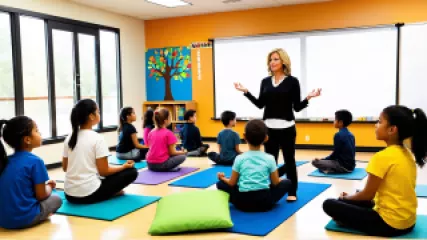Integrating Mindfulness into the Classroom: An Interview with a leading Expert
Integrating Mindfulness into the Classroom: An Interview with Erin Rhodes, a Leading Expert
The Power of Mindfulness in Education
In today's fast-paced, technology-driven world, the importance of mindfulness in education has become increasingly evident. As students navigate the demands of academic life, the ability to cultivate focus, emotional regulation, and overall well-being has become a crucial component of their success. Erin Rhodes, a renowned expert in the field of mindfulness and education, sat down with us to share her insights on the transformative potential of integrating mindfulness practices into the classroom.
Erin's Journey with Mindfulness
Erin's passion for mindfulness began at a young age, when she first experienced the profound impact it had on her own life. "Growing up, I struggled with anxiety and a tendency to become overwhelmed by the demands of school and social life," Erin recalls. "It was through the practice of mindfulness that I was able to find a sense of inner calm and resilience that helped me navigate those challenging times."
After earning her degree in educational psychology, Erin dove deeper into the field of mindfulness, studying its applications in the classroom. "I was fascinated by the growing body of research that demonstrated the cognitive, emotional, and social benefits of mindfulness for students," she explains. "I knew I wanted to dedicate my career to sharing these transformative practices with educators and their students."
The Challenges of Implementing Mindfulness in Schools
While the potential of mindfulness in education is widely recognized, Erin acknowledges that implementation can often be a complex and multifaceted challenge. "Many schools and teachers are eager to incorporate mindfulness, but they often struggle with finding the time and resources to do so effectively," she says. "There can also be resistance from parents or administrators who may not fully understand the value of these practices."
Erin emphasizes the importance of taking a thoughtful and systematic approach to integrating mindfulness into the curriculum. "It's not enough to simply offer a few mindfulness exercises here and there. To truly see the benefits, mindfulness needs to be woven into the fabric of the school culture, with ongoing support and professional development for teachers."
Mindfulness Curriculum and Strategies
Drawing on her extensive experience, Erin has developed a comprehensive mindfulness curriculum that can be tailored to the unique needs of different schools and age groups. "At the core of our approach is the belief that mindfulness should be taught in a way that is engaging, accessible, and relevant to students' daily lives," she explains.
The curriculum includes a range of evidence-based practices, such as:
- Breath awareness exercises to cultivate focus and present-moment attention
- Body scans to develop self-awareness and emotional regulation
- Guided visualizations to promote relaxation and stress reduction
- Mindful movement practices to integrate the mind-body connection
- Journaling and reflection activities to encourage self-expression and introspection
Throughout the curriculum, Erin emphasizes the importance of making mindfulness practice accessible and engaging for students of all ages and backgrounds. "We work closely with teachers to ensure that the activities are tailored to their students' needs and interests, while still maintaining the core principles of mindfulness."
The Benefits of Mindfulness in the Classroom
As Erin and her team have implemented their mindfulness curriculum in schools across the country, they have witnessed firsthand the profound impact it can have on students' academic, social, and emotional well-being. "We've seen students develop greater focus and concentration, leading to improved academic performance," she says. "But perhaps even more importantly, we've seen them cultivate a greater sense of self-awareness, empathy, and resilience in the face of life's challenges."
One of the most remarkable outcomes, according to Erin, is the way mindfulness can foster a more positive and supportive classroom environment. "When students learn to regulate their emotions and engage in thoughtful, compassionate communication, it can have a ripple effect on the entire school community," she explains. "We've seen classrooms transform into spaces of mutual understanding, respect, and collaboration."
Overcoming Barriers and Scaling Impact
Despite the overwhelming evidence in support of mindfulness in education, Erin acknowledges that there are still significant barriers to widespread implementation. "Lack of funding, limited teacher training, and resistance to change can all be significant hurdles," she says. "But we're committed to finding creative solutions to these challenges and scaling the impact of mindfulness in schools nationwide."
One of Erin's key strategies is to partner with educational organizations, policymakers, and researchers to advocate for the integration of mindfulness into educational standards and curricula. "By building a strong evidence base and demonstrating the tangible benefits of these practices, we can help shift the narrative and make mindfulness a core component of every student's educational experience."
A Call to Action for Educators
As Erin reflects on the transformative power of mindfulness in education, she extends a heartfelt call to action for educators and school leaders. "I believe that mindfulness has the potential to revolutionize the way we approach teaching and learning," she says. "By empowering students to develop self-awareness, emotional resilience, and a deeper connection to their own inner resources, we can pave the way for a generation of young people who are better equipped to navigate the challenges of the modern world."
Erin's message is one of hope and inspiration, inviting educators to embrace the mindfulness movement and become agents of positive change within their schools and communities. "The time is now to prioritize the well-being of our students and invest in practices that can truly transform their lives," she concludes. "Together, we can create a more mindful, compassionate, and equitable educational landscape for all."
For more information on Erin Rhodes and her work in the field of mindfulness and education, please visit www.mindfulnessineducation.org.






